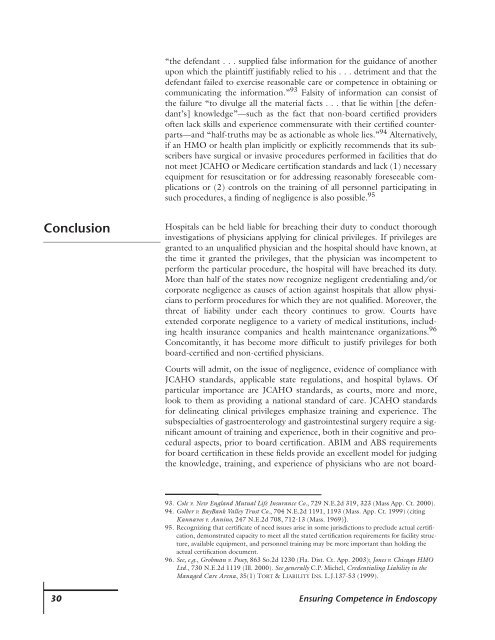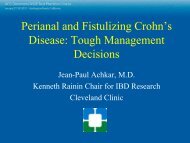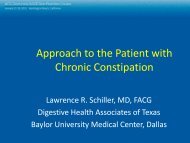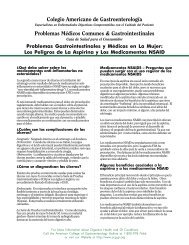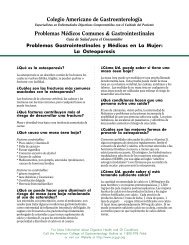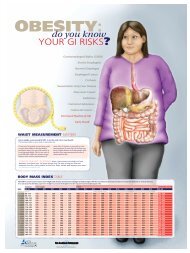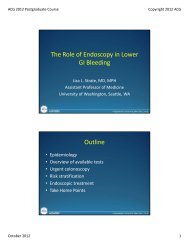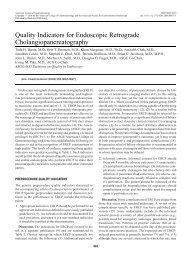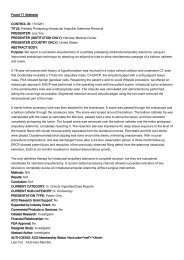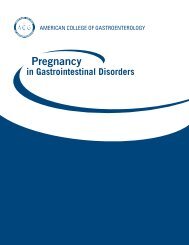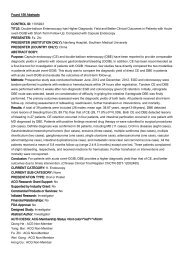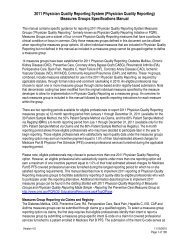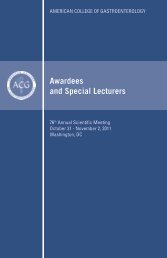Ensuring Competence in Endoscopy - American College of ...
Ensuring Competence in Endoscopy - American College of ...
Ensuring Competence in Endoscopy - American College of ...
You also want an ePaper? Increase the reach of your titles
YUMPU automatically turns print PDFs into web optimized ePapers that Google loves.
“the defendant . . . supplied false <strong>in</strong>formation for the guidance <strong>of</strong> another<br />
upon which the pla<strong>in</strong>tiff justifiably relied to his . . . detriment and that the<br />
defendant failed to exercise reasonable care or competence <strong>in</strong> obta<strong>in</strong><strong>in</strong>g or<br />
communicat<strong>in</strong>g the <strong>in</strong>formation.” 93 Falsity <strong>of</strong> <strong>in</strong>formation can consist <strong>of</strong><br />
the failure “to divulge all the material facts . . . that lie with<strong>in</strong> [the defendant’s]<br />
knowledge”—such as the fact that non-board certified providers<br />
<strong>of</strong>ten lack skills and experience commensurate with their certified counterparts—and<br />
“half-truths may be as actionable as whole lies.” 94 Alternatively,<br />
if an HMO or health plan implicitly or explicitly recommends that its subscribers<br />
have surgical or <strong>in</strong>vasive procedures performed <strong>in</strong> facilities that do<br />
not meet JCAHO or Medicare certification standards and lack (1) necessary<br />
equipment for resuscitation or for address<strong>in</strong>g reasonably foreseeable complications<br />
or (2) controls on the tra<strong>in</strong><strong>in</strong>g <strong>of</strong> all personnel participat<strong>in</strong>g <strong>in</strong><br />
such procedures, a f<strong>in</strong>d<strong>in</strong>g <strong>of</strong> negligence is also possible. 95<br />
Conclusion<br />
Hospitals can be held liable for breach<strong>in</strong>g their duty to conduct thorough<br />
<strong>in</strong>vestigations <strong>of</strong> physicians apply<strong>in</strong>g for cl<strong>in</strong>ical privileges. If privileges are<br />
granted to an unqualified physician and the hospital should have known, at<br />
the time it granted the privileges, that the physician was <strong>in</strong>competent to<br />
perform the particular procedure, the hospital will have breached its duty.<br />
More than half <strong>of</strong> the states now recognize negligent credential<strong>in</strong>g and/or<br />
corporate negligence as causes <strong>of</strong> action aga<strong>in</strong>st hospitals that allow physicians<br />
to perform procedures for which they are not qualified. Moreover, the<br />
threat <strong>of</strong> liability under each theory cont<strong>in</strong>ues to grow. Courts have<br />
extended corporate negligence to a variety <strong>of</strong> medical <strong>in</strong>stitutions, <strong>in</strong>clud<strong>in</strong>g<br />
health <strong>in</strong>surance companies and health ma<strong>in</strong>tenance organizations. 96<br />
Concomitantly, it has become more difficult to justify privileges for both<br />
board-certified and non-certified physicians.<br />
Courts will admit, on the issue <strong>of</strong> negligence, evidence <strong>of</strong> compliance with<br />
JCAHO standards, applicable state regulations, and hospital bylaws. Of<br />
particular importance are JCAHO standards, as courts, more and more,<br />
look to them as provid<strong>in</strong>g a national standard <strong>of</strong> care. JCAHO standards<br />
for del<strong>in</strong>eat<strong>in</strong>g cl<strong>in</strong>ical privileges emphasize tra<strong>in</strong><strong>in</strong>g and experience. The<br />
subspecialties <strong>of</strong> gastroenterology and gastro<strong>in</strong>test<strong>in</strong>al surgery require a significant<br />
amount <strong>of</strong> tra<strong>in</strong><strong>in</strong>g and experience, both <strong>in</strong> their cognitive and procedural<br />
aspects, prior to board certification. ABIM and ABS requirements<br />
for board certification <strong>in</strong> these fields provide an excellent model for judg<strong>in</strong>g<br />
the knowledge, tra<strong>in</strong><strong>in</strong>g, and experience <strong>of</strong> physicians who are not board-<br />
93. Cole v. New England Mutual Life Insurance Co., 729 N.E.2d 319, 323 (Mass App. Ct. 2000).<br />
94. Golber v. BayBank Valley Trust Co., 704 N.E.2d 1191, 1193 (Mass. App. Ct. 1999) (cit<strong>in</strong>g<br />
Kannavos v. Ann<strong>in</strong>o, 247 N.E.2d 708, 712-13 (Mass. 1969)).<br />
95. Recogniz<strong>in</strong>g that certificate <strong>of</strong> need issues arise <strong>in</strong> some jurisdictions to preclude actual certification,<br />
demonstrated capacity to meet all the stated certification requirements for facility structure,<br />
available equipment, and personnel tra<strong>in</strong><strong>in</strong>g may be more important than hold<strong>in</strong>g the<br />
actual certification document.<br />
96. See, e.g., Grobman v. Posey, 863 So.2d 1230 (Fla. Dist. Ct. App. 2003); Jones v. Chicago HMO<br />
Ltd., 730 N.E.2d 1119 (Ill. 2000). See generally C.P. Michel, Credential<strong>in</strong>g Liability <strong>in</strong> the<br />
Managed Care Arena, 35(1) TORT & LIABILITY INS. L.J.137-53 (1999).<br />
30 <strong>Ensur<strong>in</strong>g</strong> <strong>Competence</strong> <strong>in</strong> <strong>Endoscopy</strong>


